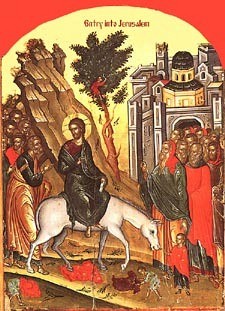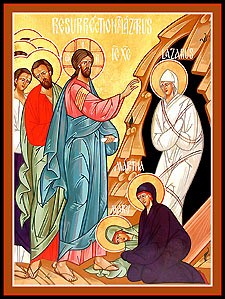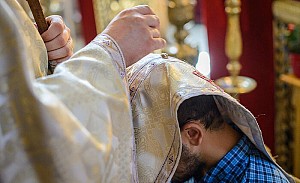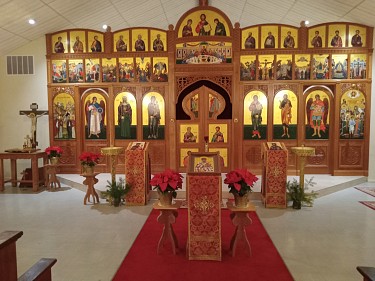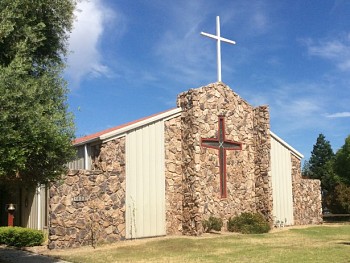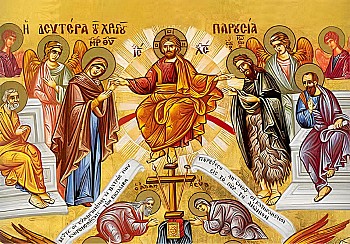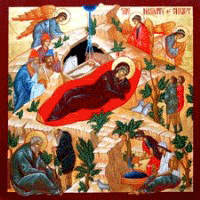Palm Sunday Worship
Divine Liturgy - Sunday April 28 @ 10am
FESTAL FISH DINNER FOLLOWS SERVICES
Fundraiser for Camp Eugene
Palm Sunday is the celebration of the triumphant entrance of Christ into the royal city of Jerusalem. He rode on a colt for which He Himself had sent, and He permitted the people to hail Him publicly as a king. A large crowd met Him in a manner befitting royalty, waving palm branches and placing their garments in His path. They greeted Him with these words: “Hosanna! Blessed is he who comes in the name of the Lord, even the King of Israel! (John 12:13).
This day together with the raising of Lazarus are signs pointing beyond themselves to the mighty deeds and events which consummate Christ’s earthly ministry. The time of fulfillment was at hand. Christ’s raising of Lazarus points to the destruction of death and the joy of resurrection which will be accessible to all through His own death and resurrection. His entrance into Jerusalem is a fulfillment of the messianic prophecies about the king who will enter his holy city to establish a final kingdom. “Behold, your king is coming to you, humble, and mounted on an ass, and on a colt, the foal of an ass” (Zech 9:9).
Finally, the events of these triumphant two days are but the passage to Holy Week: the “hour” of suffering and death for which Christ came. Thus the triumph in a earthly sense is extremely short-lived. Jesus enters openly into the midst of His enemies, publicly saying and doing those things which mostly enrage them. The people themselves will soon reject Him. They misread His brief earthly triumph as a sign of something else: His emergence as a political messiah who will lead them to the glories of an earthly kingdom.
Join Us this Weekend!
for the Celebraion of
Lazarus Saturday
Divine Liturgy Sat Apr 27 at 9:00 a.m.
Palm Sunday
Divine Liturgy Sun Apr 28 at 10:00 a.m
Potluck Fish Luncheon Fundraiser
for Camp Eugene follows Liturgy
Lazarus Saturday
Divine Liturgy - Saturday April 27 @ 9am
In a carefully detailed narrative the Gospel relates how Christ, six days before His own death, and with particular mindfulness of the people “standing by, that they may believe that thou didst send me” (John I I :42), went to His dead friend Lazarus at Bethany outside of Jerusalem. He was aware of the approaching death of Lazarus but deliberately delayed His coming, saying to His disciples at the news of His friend’s death: “For your sake I am glad that I was not there, so that you may believe” (John 11:14).
When Jesus arrived at Bethany, Lazarus was already dead four days. This fact is repeatedly emphasized by the Gospel narrative and the liturgical hymns of the feast. The four-day burial underscores the horrible reality of death. Man, created by God in His own image and likeness, is a spiritual-material being, a unity of soul and body. Death is destruction; it is the separation of soul and body. The soul without the body is a ghost, as one Orthodox theologian puts it, and the body without the soul is a decaying corpse. “I weep and I wail, when I think upon death, and behold our beauty, fashioned after the image of God, lying in the tomb dishonored, disfigured, bereft of form.” This is a hymn of St John of Damascus sung at the Church’s burial services. This “mystery” of death is the inevitable fate of man fallen from God and blinded by his own prideful pursuits.
With epic simplicity the Gospel records that, on coming to the scene of the horrible end of His friend, “Jesus wept” (John 11:35). At this moment Lazarus, the friend of Christ, stands for all men, and Bethany is the mystical center of the world. Jesus wept as He saw the “very good” creation and its king, man, “made through Him” (John 1:3) to be filled with joy, life and light, now a burial ground in which man is sealed up in a tomb outside the city, removed from the fullness of life for which he was created, and decomposing in darkness, despair and death. Again as the Gospel says, the people were hesitant to open the tomb, for “by this time there will be an odor, for he has been dead four days” (John 11:39).
When the stone was removed from the tomb, Jesus prayed to His Father and then cried with a loud voice: “Lazarus, come out.” The icon of the feast shows the particular moment when Lazarus appears at the entrance to the tomb. He is still wrapped in his grave clothes and his friends, who are holding their noses because of the stench of his decaying body, must unwrap him. In everything stress is laid on the audible, the visible and the tangible. Christ presents the world with this observable fact: on the eve of His own suffering and death He raises a man dead four days! The people were astonished. Many immediately believed on Jesus and a great crowd began to assemble around Him as the news of the raising of Lazarus spread. The regal entry into Jerusalem followed.
Dont' Miss this Wonderful Lenten Service
Wednesday April 24 @ 6:00pm
Learn about the Liturgy of the
Presanctified Gifts HERE
EXTRA!! If you miss Tuesday April 16 Service:
Listen to Fr. Lawrence read the story of
Saint Mary of Egypt
Brotherhood of St. John
No meetings until May
Open to all men of the church
Myrrhbearers - Lenten Retreat
No meetings until May
Open to all women of the church
COME! WORSHIP WITH US!
Saturday at 5pm - Great Vespers service
Sunday at 10am Divine Liturgy service
Sunday Divine Liturgy is followed by a
Fellowship Luncheon in the Church Hall
Everyone is welcome!
Illumine our hearts, O Master, Lover of mankind, with the pure light of Your divine knowledge. Open the eyes of our mind to the understanding of Your gospel teachings. Instill also in us the fear of Your blessed commandments, that trampling all carnal desires, we may enter upon a spiritual manner of living, both thinking and doing such things that are well-pleasing to You,
Before the Judgment Seat of Christ
Fr. Stephen Freeman
Church Office Hours
PLEASE CALL FOR CURRENT SCHEDULE
(209) 812-6232
Use this time for private prayer
or volunteer your time to our parish
Visitors Welcome!
Extensive and excellent guide to
Orthodox Christian vocabulary
by the Orthodox Church of the Mother of God
"Human beings are created to be good"
April 24, 2024
Listen to the audio of
Fr. Lawrence's Gospel Readings and Sermons
"Human beings are created to be good" April 21, 2024
"The Cross is the Tree of Life" April 7, 2024
"St. Gregory Palamas - Hesychastic Prayer - Jesus Prayer" Mar 31, 2024
"Our Lenten Journey: Forgiveness and Spiritual Renewal" - Mar 17, 2024
"Remember our calling as human beings" - Mar 10, 2024
"Sunday of the Prodigal Son" - Mar 3, 2024
"The Cross is the 'Tree of Life'"
April 7, 2024
FORGIVING OTHERS
“If you are about to offer your gift to God at the altar and there you remember that your brother has something against you, leave your gift there in front of the altar, go at once and make peace with your brother, and then come back and offer your gift to God” (Mt. 5:23-24).
“When you stand and pray, forgive anything you have against anyone, so that your Father in heaven will forgive the wrongs you have done” (Mk. 11:25).
In the Lord’s Prayer Jesus taught His followers to pray: “Forgive us our trespasses, as we forgive those who trespass against us” (Mt. 6:12, RSV).
“Get rid of all bitterness, passion, and anger. No more shouting or insults, no more hateful feelings of any kind. Instead, be kind and tender hearted to one another, and forgive one another, as God has forgiven you through Christ” (Eph. 4:31-32).
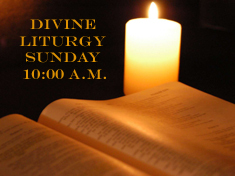 |

